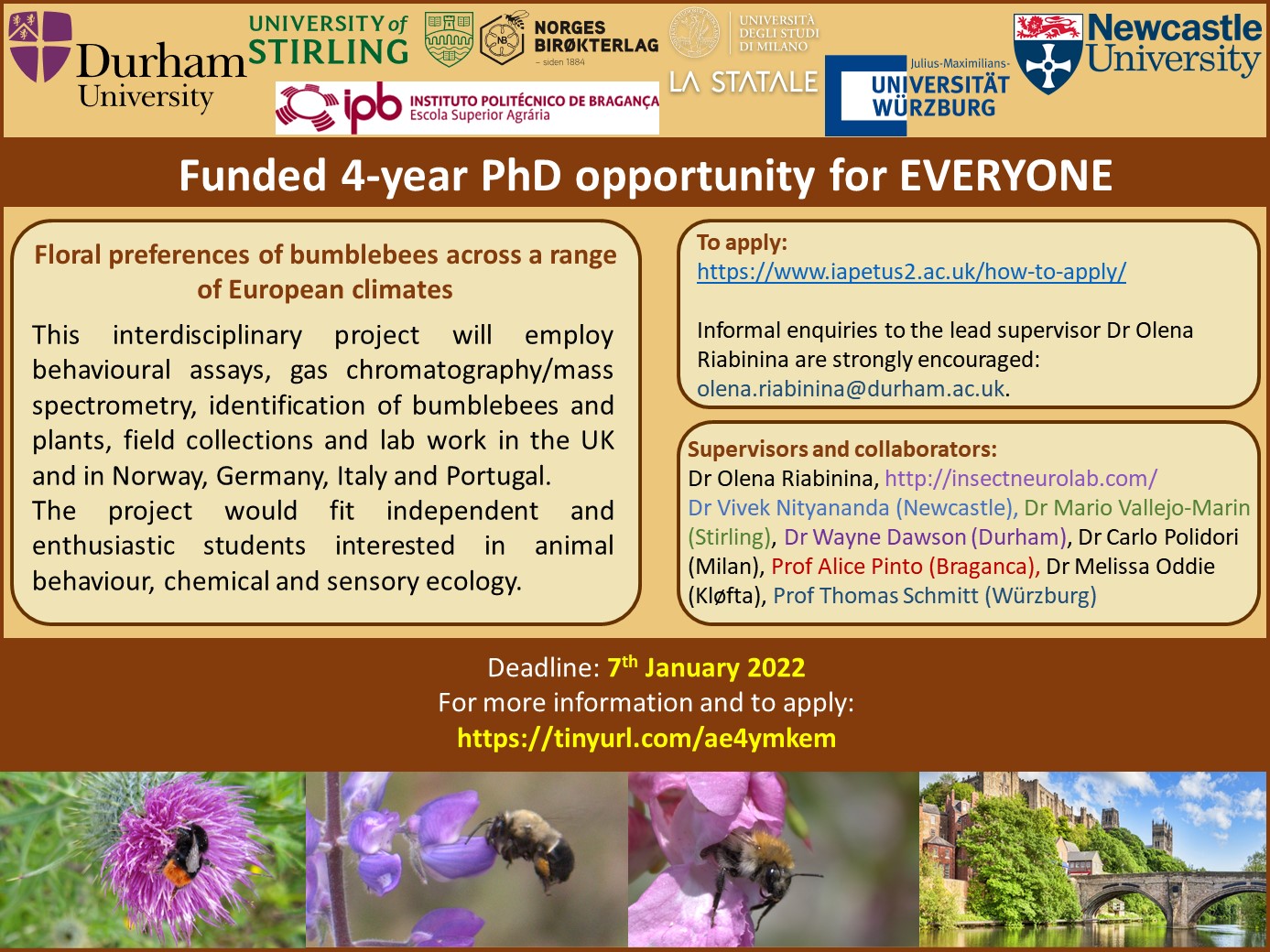PhD position: Floral preferences of bumblebees across a range of European climates
Posted by Olena Riabinina, on 14 November 2021
Location: Durham, UK
Closing Date: 7 January 2022

Background. Bumblebees are agriculturally important pollinators, but are currently declining in abundance in the UK and around the world, in part due to climate change (Soroye et al. 2020). Understanding these declines requires research on the biology and ecology of these species. Bumblebees are thought to be generalists, pollinating a variety of flower species. However, our preliminary observations conducted in Durham in summers 2020 and 2021 indicate that different bumblebee species prefer different plants (see also Sikora et al. 2020). Bumblebees have been a preferred insect model for neuroethology and sensory neuroscience, and a wealth of earlier work has focussed on the importance of visual cues and nectar/pollen reward for foraging honeybees and bumblebees (Latty and Trueblood 2020). In contrast, the importance of floral smells is less well known, although some works report the essential role of flower volatiles in bumblebees’ floral choice (Galen and Kevan 1983; Suchet et al. 2011; Haber et al. 2019). This project will investigate olfactory preferences of commonly occurring bumblebees (e.g. Bombus terrestris, Bombus pascuorum and Bombus lapidarius) to naturally-occurring floral volatiles, and how these preferences are affected by climatic conditions and background plant communities in Norway (Kløfta), UK (Durham and Stirling), Germany (Würzburg), Italy (Milan) and Portugal (Braganca). We expect the plants that the bumblebees forage on to differ between these location, due to different climatic condition. We hypothesise that, despite the differences in plant species, the key components of floral bouquets will be very similar across test locations.
Aims. 1) To identify plants that bumblebees forage on in the five countries, to establish plant preferences for bumblebee species; 2) Collect floral volatiles from the plants identified in Aim 1, as well as florals that bumblebees do not forage on, as controls; analyse these volatiles by GC/MS ; 3) Establish behavioural preferences of bumblebees in response to full floral bouquets and components of bouquets, fractions and synthetic components of that are specific for focal plant species.
Methodology: Bee and plant collections will be conducted in the areas around Durham, Stirling, Kløfta, Würzburg, Milan and Braganca in March-September during the local bumblebee foraging periods. The student will be advised and assisted during field collection by OR and local members of the supervisory team. Student will be trained to identify plants and bumblebees via morphological cues and DNA barcoding. Floral volatiles will be collected at the same time as bumblebees by using standard volatiles traps, and will be analysed by the student via gas chromatography-mass spectrometry in TS laboratory. Behavioural olfactory assays on bees will be conducted in the field or either in the glasshouse at the Biocentre, University of Würzburg or in a glasshouse at Durham Botanical garden. The bees will be given a choice between 2 stimuli, or stimulus and a control, and their preference for a smell will be inferred from the tendency of a bee to land at the stimulus.
Training and skills: The student will receive training: 1) by supervisors with complementary skills and expertise; 2) by collaborators and postdocs in the seven participating institutions; 3) by attending summer courses, conferences and Durham-run training events; 4) by participating in regular public outreach activities; 5) by helping OR to supervise UG students; 6) by presenting their work at lab meetings and conferences. The student will acquire knowledge and skills in: 1) insect chemical ecology and neuroethology; 2) gas chromatography/mass spectrometry and collection of volatiles; 3) bumblebee rearing; 4) identification of bumblebees and plants; 5) molecular biology methods; 6) cutting-edge techniques for behavioural analysis; 7) presentation and scientific writing; 8) research supervision; 9) Impact and public outreach.
Requirements:
We are looking for an independent and enthusiastic student able to develop the project and drive it forward. Interest in sensory ecology, neuroethology, animal behaviour, chemical ecology and previous research experience are a plus.
You should be available to conduct field and lab work in the UK and in continental Europe. The peak time for field work is in March – September.
Further information: Informal enquiries ARE STRONGLY ENCOURAGED and should be directed to Dr Lena Riabinina, olena.riabinina@durha.ac.uk, +44-191-334-1282
Closing Date: 7 January 2022
Duration: Fixed term

